Presented by: Tasha Perdue, PhD
Presentation title: Characterizing Prescription Opioid, Heroin, and Fentanyl Initiation Trajectories

The current crisis of overdose deaths has been driven by widespread opioid use, characterized by distinct ‘waves’ of drug use. The first wave was driven by prescription opioids, the second by heroin, and the third by illicit, non-pharmaceutical fentanyl and fentanyl analogues. The purpose of this presentation is to describe opioid initiation within each of the three waves from the perspective of people who use illicit opioids, with a focus on emerging pathways into fentanyl use.
 Tasha Perdue is an Assistant Professor in the John Glenn College of Public Affairs and Affiliated Faculty in the Drug Enforcement and Policy Center in the Moritz College of Law at The Ohio State University. Dr. Perdue’s research contextualizes drug use and elucidates ways that inequities in criminal justice responses to drug crises perpetuate trajectories of risk and drug use, demonstrating the essential relationship of public health and criminal justice policy. She is currently the Co-PI on a National Institute of Justice funded mixed methods study examining racial disparities in drug sentencing and admittance to drug court. Perdue’s academic work is informed by her professional experiences in the field. She has worked as a case manager in a community mental health center and a regional epidemiologist for the Ohio Department of Mental Health and Addiction Services. She also volunteered with and researched in a harm reduction center in Skid Row, Los Angeles. Perdue’s PhD is from the Suzanne-Dworak Peck School of Social Work at the University of Southern California. She also completed a Graduate Certificate in Public Policy from USC’s Price School of Public Policy, her Master of Social Work from the University of Michigan, and her BS in criminal justice, with a minor in sociology, from Bowling Green State University.
Tasha Perdue is an Assistant Professor in the John Glenn College of Public Affairs and Affiliated Faculty in the Drug Enforcement and Policy Center in the Moritz College of Law at The Ohio State University. Dr. Perdue’s research contextualizes drug use and elucidates ways that inequities in criminal justice responses to drug crises perpetuate trajectories of risk and drug use, demonstrating the essential relationship of public health and criminal justice policy. She is currently the Co-PI on a National Institute of Justice funded mixed methods study examining racial disparities in drug sentencing and admittance to drug court. Perdue’s academic work is informed by her professional experiences in the field. She has worked as a case manager in a community mental health center and a regional epidemiologist for the Ohio Department of Mental Health and Addiction Services. She also volunteered with and researched in a harm reduction center in Skid Row, Los Angeles. Perdue’s PhD is from the Suzanne-Dworak Peck School of Social Work at the University of Southern California. She also completed a Graduate Certificate in Public Policy from USC’s Price School of Public Policy, her Master of Social Work from the University of Michigan, and her BS in criminal justice, with a minor in sociology, from Bowling Green State University.
Presented by: Gina Wingood, ScD, MPH
Presentation title: Addressing Health Equity in Women's HIV Prevention Interventions
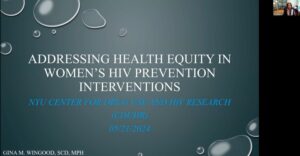
 Gina M. Wingood, ScD, MPH, is the Sidney and Helaine Lerner Professor of Public Health Promotion, Director of the Lerner Center for Public Health Promotion, Director of the Health Communication Certificate, Director of the T32 on Social Determinants of HIV, and Co-Director of the HIV Center for Clinical and Behavioral Studies. Dr. Wingood is a distinguished researcher and academic leader in the health promotion field, with decades of expertise designing, evaluating, and disseminating interventions that reduce health disparities in HIV. Dr. Wingood dedicated her life to developing gender- and culturally tailored HIV prevention interventions for African American women. She has received international acclaim for her research on social determinants of health and was previously featured in Science as a highly-funded African American NIH grant recipient. Dr. Wingood’s Sisters Informing Sisters about Topics in AIDS (SISTA) intervention and five other HIV prevention interventions have been endorsed by the Centers for Disease Control and Prevention (CDC) and implemented widely across the country and globally. She has been invited twice as a speaker to the White House to share her experience with evidence-based, HIV interventions. Dr. Wingood published over 350 peer-reviewed articles across a wide array of public health and medical journals and served as Principal Investigator or Co-Principal Investigator on over 20 grants funded by the National Institutes of Health (NIH).
Gina M. Wingood, ScD, MPH, is the Sidney and Helaine Lerner Professor of Public Health Promotion, Director of the Lerner Center for Public Health Promotion, Director of the Health Communication Certificate, Director of the T32 on Social Determinants of HIV, and Co-Director of the HIV Center for Clinical and Behavioral Studies. Dr. Wingood is a distinguished researcher and academic leader in the health promotion field, with decades of expertise designing, evaluating, and disseminating interventions that reduce health disparities in HIV. Dr. Wingood dedicated her life to developing gender- and culturally tailored HIV prevention interventions for African American women. She has received international acclaim for her research on social determinants of health and was previously featured in Science as a highly-funded African American NIH grant recipient. Dr. Wingood’s Sisters Informing Sisters about Topics in AIDS (SISTA) intervention and five other HIV prevention interventions have been endorsed by the Centers for Disease Control and Prevention (CDC) and implemented widely across the country and globally. She has been invited twice as a speaker to the White House to share her experience with evidence-based, HIV interventions. Dr. Wingood published over 350 peer-reviewed articles across a wide array of public health and medical journals and served as Principal Investigator or Co-Principal Investigator on over 20 grants funded by the National Institutes of Health (NIH).
Presented by: Daliah Heller, PhD, MPH
Presentation title: What’s Really Holding Harm Reduction Back and How Research Can Help Us Move Forward
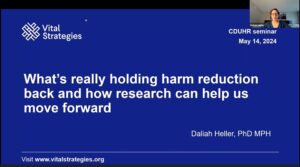
Harm reduction services in the United States have always operated in an environment shaped by the war on drugs framework. Heightened drug criminalization and the entrenchment of systemic social penalties for drug use have exacerbated structural vulnerabilities to drug-related health harms, already enforced by racism and poverty. This environment reinforces the stigma attached to drug use and produces the often-willful misunderstanding that harm reduction services promote drug use. Taken together, these dynamics complicate and undermine the development, sustainability, and impact of harm reduction services. In this complex landscape, how can research help? Implementation science can help to demonstrate how harm reduction services mitigate structural vulnerabilities, and messaging research can help to dispel myths and improve understanding of how services work. Researchers are uniquely positioned to elucidate the inherent policy and practice conflicts with harm reduction services in this environment, and to articulate the strategic pathways through, and forward.
 Daliah Heller is a public health leader who has worked for three decades to mount a humane health-based response to drug use. As Vice President of Drug Use Initiatives at Vital Strategies, she leads a multi-state initiative to reduce overdose deaths in the United States, and represents the organization in technical consultations on drug use with World Health Organization and other country governments and civil society. Previously, Daliah was Assistant Commissioner at the New York City Health Department, and before that, Executive Director of a multi-service harm reduction program in the Bronx. She holds a PhD in Social Welfare from City University of New York and MPH from Columbia University, and teaches as an Adjunct Instructor at New York University School of Global Public Health.
Daliah Heller is a public health leader who has worked for three decades to mount a humane health-based response to drug use. As Vice President of Drug Use Initiatives at Vital Strategies, she leads a multi-state initiative to reduce overdose deaths in the United States, and represents the organization in technical consultations on drug use with World Health Organization and other country governments and civil society. Previously, Daliah was Assistant Commissioner at the New York City Health Department, and before that, Executive Director of a multi-service harm reduction program in the Bronx. She holds a PhD in Social Welfare from City University of New York and MPH from Columbia University, and teaches as an Adjunct Instructor at New York University School of Global Public Health.
Presented by: Keosha Bond, EdD, MPH, CHES; Patrick Janulis, PhD; Courtney McKnight, DrPH; and Diana Sheehan, PhD
Presentation title: Obtaining Your First R01 in a Competitive Research Climate

In this special panel presentation, our presenters will discuss their paths to R01 funding. They will talk about time management for developing their applications, helpful supports, how they obtained data for preliminary studies, and their plans for subsequent R01 applications.
 Keosha Bond, EdD, MPH, CHES (City University of New York School of Medicine)
Keosha Bond, EdD, MPH, CHES (City University of New York School of Medicine)
R01 – Estimating the Impact of a Multilevel, Multicomponent Intervention to Increase Uptake of HIV Testing and Biomedical HIV Prevention among African American/Black Gay, Bisexual and Same-gender Loving Men (MPI: Frye, Bond, and Duncan)
Keosha T. Bond is an Assistant Medical Professor in the Department of Community Health and Social Medicine at the CUNY School of Medicine and the Director of the LOVE Project Lab. Her work as a sexual health educator and trained behavioral scientist has focused on the intricate interconnections between social justice, health equity, race, and sexuality. Dr. Bond‘s research interests focus on understanding how socio-structural and cultural factors influence the transmission HIV among marginalized and minoritized communities. Her overall program of research is focused on the development of eHealth interventions using sex positive, human-centered designs to address sexual health disparities among Black/African Americans and marginalized subpopulations within that group including cisgender women, gender diverse individuals, and sexual minority men. Dr. Bond is a NIDA-trained, certified Health Education Specialist with a Doctorate in Health Education from Columbia University Teachers College, a Master of Public Health from CUNY-Hunter College, and a Bachelor of Science in Psychology from Fordham University.
 Patrick Janulis, PhD (Northwestern University Feinberg School of Medicine)
Patrick Janulis, PhD (Northwestern University Feinberg School of Medicine)
R01 – Leveraging Data Synthesis to Identify Optimal and Robust Strategies for HIV Elimination Among Substance-Using MSM
Patrick Janulis is an Associate Professor in the Department of Medical Social Sciences within the Feinberg School of Medicine at Northwestern University and also serves as a Quantitative Methodologist for the Third Coast Center for AIDS Research. His research examines the intersection of HIV and drug use, with particular interest in measurement science and network analysis. His measurement research uses latent variable models to more accurately estimate HIV risk and substance use behaviors and links these measures across studies. His network analysis research focuses on improving estimates of sexual network parameters, using these parameters in network based epidemic models, and leveraging this knowledge to optimize the impact of HIV prevention interventions.
 Courtney McKnight, DrPH (New York University School of Global Public Health)
Courtney McKnight, DrPH (New York University School of Global Public Health)
R01 – Risk Factors for AIDS among Persons Who Inject Drugs: HIV and COVID-19 (MPI: Des Jarlais and McKnight)
Courtney McKnight is a Clinical Assistant Professor in the Department of Epidemiology at New York University’s School of Global Public Health where she specializes in mixed methods research focused on the epidemiology of drug use, drug overdose, HIV and HCV infection. Dr. McKnight began her career in public health directing a harm reduction program for women who use drugs and volunteering at a syringe services program. Her research interests include examining changes in the unregulated drug supply, including the use of fentanyl and xylazine, and how these changes impact people who use drugs. She is PI on a CDUHR pilot project examining xylazine test strip use and HIV risk behaviors among a cohort of people who inject drugs in New York City, and a Co-Investigator on the DRIVE project, a community-based intervention study in Haiphong, Vietnam that identifies and links HIV positive people who inject drugs to HIV care through peer support to facilitate individual-level viral suppression with the over-arching goal of reducing population viral load and ending the HIV epidemic among PWID in Haiphong.
 Diana Sheehan, PhD (Florida International University)
Diana Sheehan, PhD (Florida International University)
R01 – Efficacy of an mHealth + e-Navigator Stepped Care Intervention for ART Adherence Among Latino MSM
Diana Sheehan is an Associate Professor in the Department of Epidemiology at the Robert Stempel College of Public Health and Social Work at Florida International University (FIU). She aims to contribute to health equity among the Latino population via epidemiologic studies that identify disparities along the HIV care continuum and via the design and testing of evidence-based interventions. Her current K01 examines how daily substance use, psychosocial factors, and activity spaces affect ART adherence and develops the groundwork for a just-in-time adaptive intervention to improve ART adherence.
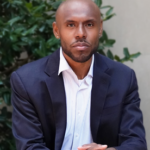 Dustin Duncan, ScD (Columbia University)
Dustin Duncan, ScD (Columbia University)
Dustin T. Duncan is the Associate Dean for Health Equity Research and Associate Professor in the Department of Epidemiology at Columbia University’s Mailman School of Public Health, where he directs the Columbia Spatial Epidemiology Lab and co-directs the department’s Social and Spatial Epidemiology Unit. Dr. Duncan is a Social and Spatial Epidemiologist, studying how specific neighborhood characteristics influence population health and health disparities. His research has a strong domestic (U.S.) focus, but recent work is beginning to span across the globe (including studies in Paris, London, and Nairobi). Dr. Duncan’s work appears in leading public health, epidemiology, medical, geography, criminology, demography, and psychology journals. Working in collaborations with scholars across the world, Dr. Duncan has over 250 high-impact articles (>120 first or senior-authored), book chapters and books cited over 9,200 times; Dr. Duncan’s research has appeared in major media outlets including U.S. News & World Report, The Washington Post, The New York Times and CNN. Dr. Duncan’s work has been funded by the National Institutes of Health, the Centers for Disease Control and Prevention, the HIV Prevention Trials Network, the Robert Wood Johnson Foundation, the Verizon Foundation, and the Aetna Foundation.
Presented by: Don Des Jarlais, PhD; Edwin Salsitz, MD; David Frank, PhD; Ashly Jordan, PhD, MPH; Paul Joudrey, MD, MPH; Kimberly Sue, MD, MPH (Moderator)
Presentation title: Strategies to Improve Methadone OUD Treatment Systems: Take Home Dosing, Office-Based Methadone, and Beyond
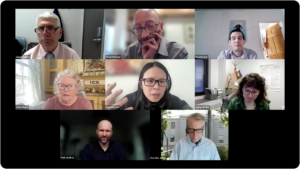
Link to Video
Don Des Jarlais – 5:26 | Slides
Edwin Salsitz – 17:07 | Slides
David Frank – 46:36 | Slides
Ashly Jordan – 1:27:24 | Slides
Paul Joudrey – 1:58:11 | Slides
Panel Discussion: Kimberly Sue, Moderator – 2:26:22
Agenda and Recommended Readings
The HIV/HCV/opioid and overdose syndemic creates an urgent need to expand and improve MOUD access, coverage, and quality. Both methadone and buprenorphine are evidence-based interventions for the reduction of overdose and the treatment of OUD, and are vital parts of combined HIV and HCV prevention. The syndemic is driven in part by the Big Trend of the rise in fentanyl. A policy window linked to the COVID-19 pandemic Big Events is facilitating relaxation of regulations which have previously limited the access to, and the quality and population-level impact of methadone treatment systems. In response, this symposium will address a range of initiatives to improve methadone treatment systems and their impacts on syndemic outcomes including through office-based treatment, increased dosing flexibility (‘take homes’), mobile vans, policy and regulation changes, and other strategies.
 Don Des Jarlais is Co-Director of the Center for Drug Use and HIV Research and Professor of Epidemiology at the NYU School of Global Public Health. Dr. Des Jarlais is a leader in the fields of HIV/AIDS and injecting drug use, and has published extensively on these topics including articles in The New England Journal of Medicine, JAMA, Science, and Nature. He is active in international research, having collaborated on studies in many different countries. He serves as a consultant to various institutions, including the U.S. Centers for Disease Control and Prevention, the National Institute of Drug Abuse, the National Academy of Sciences, and the World Health Organization. Dr. Des Jarlais’ research has received numerous awards, including a New York State Department of Health Commissioner’s award for promoting the health of persons who use drugs. He formerly served as a commissioner for the National Commission on AIDS; as a core group member of the UNAIDS Reference Group on HIV and Injecting Drug Use; and as a member of the President’s Emergency Plan for AIDS Relief (PEPFAR) Scientific Advisory Board.
Don Des Jarlais is Co-Director of the Center for Drug Use and HIV Research and Professor of Epidemiology at the NYU School of Global Public Health. Dr. Des Jarlais is a leader in the fields of HIV/AIDS and injecting drug use, and has published extensively on these topics including articles in The New England Journal of Medicine, JAMA, Science, and Nature. He is active in international research, having collaborated on studies in many different countries. He serves as a consultant to various institutions, including the U.S. Centers for Disease Control and Prevention, the National Institute of Drug Abuse, the National Academy of Sciences, and the World Health Organization. Dr. Des Jarlais’ research has received numerous awards, including a New York State Department of Health Commissioner’s award for promoting the health of persons who use drugs. He formerly served as a commissioner for the National Commission on AIDS; as a core group member of the UNAIDS Reference Group on HIV and Injecting Drug Use; and as a member of the President’s Emergency Plan for AIDS Relief (PEPFAR) Scientific Advisory Board.
 David Frank is a medical sociologist and Assistant Research Scientist at the New York University’s School of Global Public Health as well as someone who has been on methadone maintenance treatment for approximately twenty years. His work focuses primarily on methadone maintenance treatment, and uses structural perspectives to problematize the use of addiction-and-recovery narratives to conceptualize treatment. He is on the board of the National Coalition to Liberate Methadone and the current chair of the Society for the Study of Social Problems Drinking & Drugs division. He is also the recipient of the American Sociological Association Junior Scholar Award (Drinking and Drugs division) for his use of situated methodologies in research involving people who use drugs.
David Frank is a medical sociologist and Assistant Research Scientist at the New York University’s School of Global Public Health as well as someone who has been on methadone maintenance treatment for approximately twenty years. His work focuses primarily on methadone maintenance treatment, and uses structural perspectives to problematize the use of addiction-and-recovery narratives to conceptualize treatment. He is on the board of the National Coalition to Liberate Methadone and the current chair of the Society for the Study of Social Problems Drinking & Drugs division. He is also the recipient of the American Sociological Association Junior Scholar Award (Drinking and Drugs division) for his use of situated methodologies in research involving people who use drugs.
 Ashly Jordan is the Director of Research and Program Evaluation for the New York State Office of Addiction Services and Supports. She is an interdisciplinary epidemiologist with more than 15 years of applied research experience and public health practice focused on understanding how systems and interventions can improve health and social outcomes for people who use substances and who experience addiction. She has served as a consultant to the United Nations Office on Drugs and Crime. Dr. Jordan’s research has examined blood-borne and skin and soft tissue infections, tuberculosis, drug overdose, substance use epidemiology, and the impact of criminal legal involvement on substance use epidemiology and treatment trajectories. She has published extensively, including on prevention and care continua, Big Events theory, and novel metrics, and has served on study sections. Drawing on theory-based multi-level understanding of illness and health, and principles of health equity and social justice, Dr. Jordan’s research and public health practice has focused on the interplay between individual, social and structural factors on people who use substances.
Ashly Jordan is the Director of Research and Program Evaluation for the New York State Office of Addiction Services and Supports. She is an interdisciplinary epidemiologist with more than 15 years of applied research experience and public health practice focused on understanding how systems and interventions can improve health and social outcomes for people who use substances and who experience addiction. She has served as a consultant to the United Nations Office on Drugs and Crime. Dr. Jordan’s research has examined blood-borne and skin and soft tissue infections, tuberculosis, drug overdose, substance use epidemiology, and the impact of criminal legal involvement on substance use epidemiology and treatment trajectories. She has published extensively, including on prevention and care continua, Big Events theory, and novel metrics, and has served on study sections. Drawing on theory-based multi-level understanding of illness and health, and principles of health equity and social justice, Dr. Jordan’s research and public health practice has focused on the interplay between individual, social and structural factors on people who use substances.
 Paul Joudrey is an Assistant Professor in the Division of General Internal Medicine at the University of Pittsburgh School of Medicine. He provides primary care, addiction medicine, and harm reduction services within outpatient and community settings. His research focuses on identifying factors impacting addiction treatment access and outcomes across urban and rural communities and developing, evaluating, and scaling interventions tailored to community needs to improve the health of people who use drugs. This includes research to expand access to patient centered methadone treatment for opioid use disorder. He is Co-lead Investigator for NIDA CTN-131, a randomized pragmatic trial of office-based methadone versus buprenorphine. He received his undergraduate degree from Case Western Reserve University and his medical degree from New York University. Dr. Joudrey completed residency training at Montefiore Medical Center in the Primary Care Social Internal Medicine program and completed the National Clinician Scholars Program fellowship at Yale School of Medicine. Dr. Joudrey and his sister, Anne Joudrey, co-founded North Central Ohio Harm Reduction to improve the health of people who use drugs in North Central Ohio.
Paul Joudrey is an Assistant Professor in the Division of General Internal Medicine at the University of Pittsburgh School of Medicine. He provides primary care, addiction medicine, and harm reduction services within outpatient and community settings. His research focuses on identifying factors impacting addiction treatment access and outcomes across urban and rural communities and developing, evaluating, and scaling interventions tailored to community needs to improve the health of people who use drugs. This includes research to expand access to patient centered methadone treatment for opioid use disorder. He is Co-lead Investigator for NIDA CTN-131, a randomized pragmatic trial of office-based methadone versus buprenorphine. He received his undergraduate degree from Case Western Reserve University and his medical degree from New York University. Dr. Joudrey completed residency training at Montefiore Medical Center in the Primary Care Social Internal Medicine program and completed the National Clinician Scholars Program fellowship at Yale School of Medicine. Dr. Joudrey and his sister, Anne Joudrey, co-founded North Central Ohio Harm Reduction to improve the health of people who use drugs in North Central Ohio.
 Edwin A. Salsitz has been an attending physician in the Mount Sinai Beth Israel, Division of Addiction Medicine, New York City, since 1983, and is an Associate Clinical Professor of Psychiatry at the Icahn School of Medicine at Mount Sinai. He is the principal investigator of the Methadone Medical Maintenance (office-based methadone maintenance) research project. Dr. Salsitz is certified in Addiction Medicine by the American Board of Preventive Medicine, as well as by the Board of Internal Medicine and Pulmonary Disease. He has published and lectures frequently on addiction medicine topics. Dr. Salsitz is a course director for ASAM sponsored Buprenorphine and REMS safe opioid prescribing trainings, and is a lead mentor in the PCSS-MAT mentoring program. He has co-chaired the ASAM Review Course, the ASAM Common Threads Course, the ASAM State of the Art course and is a reviewer for the Journal of Addiction Medicine and Drug and Alcohol Dependence. He is the chair of the ASAM REMS course on safe and effective prescribing of opioids. Dr. Salsitz was the Co-chair of the ASAM CME committee and Chair of the New York Society of Addiction Medicine CME and Education committee. Dr. Salsitz teaches addiction medicine at the Icahn School of Medicine at Mount Sinai, to third year medical students, masters of science students, neuroscience PhD candidates, and psychiatry residents. Dr. Salsitz was a founding member of the medical advisory panel, for the New York State Office of Alcohol and Substance Abuse Services. Dr. Salsitz is the recipient of the 2014 ASAM Annual Award, the 2018 ASAM Annual Educator of the Year Award, and the 2021 NYSAM Lifetime Achievement Award.
Edwin A. Salsitz has been an attending physician in the Mount Sinai Beth Israel, Division of Addiction Medicine, New York City, since 1983, and is an Associate Clinical Professor of Psychiatry at the Icahn School of Medicine at Mount Sinai. He is the principal investigator of the Methadone Medical Maintenance (office-based methadone maintenance) research project. Dr. Salsitz is certified in Addiction Medicine by the American Board of Preventive Medicine, as well as by the Board of Internal Medicine and Pulmonary Disease. He has published and lectures frequently on addiction medicine topics. Dr. Salsitz is a course director for ASAM sponsored Buprenorphine and REMS safe opioid prescribing trainings, and is a lead mentor in the PCSS-MAT mentoring program. He has co-chaired the ASAM Review Course, the ASAM Common Threads Course, the ASAM State of the Art course and is a reviewer for the Journal of Addiction Medicine and Drug and Alcohol Dependence. He is the chair of the ASAM REMS course on safe and effective prescribing of opioids. Dr. Salsitz was the Co-chair of the ASAM CME committee and Chair of the New York Society of Addiction Medicine CME and Education committee. Dr. Salsitz teaches addiction medicine at the Icahn School of Medicine at Mount Sinai, to third year medical students, masters of science students, neuroscience PhD candidates, and psychiatry residents. Dr. Salsitz was a founding member of the medical advisory panel, for the New York State Office of Alcohol and Substance Abuse Services. Dr. Salsitz is the recipient of the 2014 ASAM Annual Award, the 2018 ASAM Annual Educator of the Year Award, and the 2021 NYSAM Lifetime Achievement Award.
 Kimberly Sue is an Assistant Professor of Medicine with the Program in Addiction Medicine (Division of General Internal Medicine) at Yale University School of Medicine. She is the former Medical Director of the National Harm Reduction Coalition, New York, NY, which strives to improve the health and wellbeing of people who use drugs. Currently, she serves as an Attending Physician at the Central Medical Unit, APT Foundation, which provides primary care to patients receiving methadone and other substance use treatment services and supervises fellows and trainees within the Yale Addiction Medicine Fellowship program. She also is an Attending Physician on the hospital-based Yale Addiction Medicine Consult Service. She holds board certification in both Internal Medicine and Addiction Medicine. Dr. Sue trained at Harvard’s MD-PhD Social Science Program, and has a PhD in sociocultural anthropology. Her book, Getting Wrecked: Women, Incarceration, and the American Opioid Crisis (2019), is based on her research on women with opioid use disorder in Massachusetts prison and jails. Her current research interests include harm reduction, stigma, gender/women and substance use, and overdose response strategies on local, state, and federal levels.
Kimberly Sue is an Assistant Professor of Medicine with the Program in Addiction Medicine (Division of General Internal Medicine) at Yale University School of Medicine. She is the former Medical Director of the National Harm Reduction Coalition, New York, NY, which strives to improve the health and wellbeing of people who use drugs. Currently, she serves as an Attending Physician at the Central Medical Unit, APT Foundation, which provides primary care to patients receiving methadone and other substance use treatment services and supervises fellows and trainees within the Yale Addiction Medicine Fellowship program. She also is an Attending Physician on the hospital-based Yale Addiction Medicine Consult Service. She holds board certification in both Internal Medicine and Addiction Medicine. Dr. Sue trained at Harvard’s MD-PhD Social Science Program, and has a PhD in sociocultural anthropology. Her book, Getting Wrecked: Women, Incarceration, and the American Opioid Crisis (2019), is based on her research on women with opioid use disorder in Massachusetts prison and jails. Her current research interests include harm reduction, stigma, gender/women and substance use, and overdose response strategies on local, state, and federal levels.
Presented by: Jennifer Hill, PhD
Presentation title: Causal Inference for Policy and Practice: An Introduction

Causal inference is a critical perspective for understanding the implications of decisions that are routinely made in policy and practice. This lecture reviews the role of causal inference in modern-day research on issues that impact individuals and provides an overview of foundational concepts and an introduction to several designs and methods that can facilitate the estimation of causal effects.
Foundations of causal inference
The first half of the session will motivate the scientific importance of causal inference through real world examples and describe the potential outcome framework, which formalizes key concepts. Randomized trials will be introduced as an ideal template statistically for causal inference before turning to settings where pristine randomization is infeasible. Dr. Hill will also discuss the ethics of randomized experiments and adaptations that may work better to meet the needs of stakeholders.
Quasi-experimental designs and methods
The second half of the session will focus on designs and methods that relax the assumptions that have been randomized or have measured all confounding covariates. Examples include difference in differences, interrupted time series, and regression discontinuity designs. Each will be motivated with a real-world application and will include a discussion of the plausibility of the assumptions, and describe relevant software. She will conclude with a brief discussion of further avenues for exploration.
 Jennifer Hill is Associate Director of the Methods Core in CDUHR. She is currently Co-Chair of the Department of Applied Statistics, Social Science, and Humanities (ASH) Department as well as the Co-Director of the Center for Practice and Research at the Intersection of Information, Society, and Methodology (PRIISM). She was the co-founder of the Master’s of Science Program in Applied Statistics for Social Science Research (A3SR). The A3SR program has a concentration in Data Science for Social Impact. As far as we know this is the first degree granting program in Statistics or Data Science for Social Impact or Social Good in the world.
Jennifer Hill is Associate Director of the Methods Core in CDUHR. She is currently Co-Chair of the Department of Applied Statistics, Social Science, and Humanities (ASH) Department as well as the Co-Director of the Center for Practice and Research at the Intersection of Information, Society, and Methodology (PRIISM). She was the co-founder of the Master’s of Science Program in Applied Statistics for Social Science Research (A3SR). The A3SR program has a concentration in Data Science for Social Impact. As far as we know this is the first degree granting program in Statistics or Data Science for Social Impact or Social Good in the world.
Dr. Hill develops and evaluates methods to help answer the types of causal questions that are vital to policy research and scientific development. In particular she focuses on situations in which it is difficult or impossible to perform traditional randomized experiments, or when even seemingly pristine study designs are complicated by missing data or hierarchically structured data. Most recently Hill has been pursuing two intersecting strands of research. The first focuses on Bayesian nonparametric methods that allow for flexible estimation of causal models and are less time-consuming and more precise than competing methods (e.g. propensity score approaches). The second line of work pursues strategies for exploring the impact of violations of typical causal inference assumptions such as ignorability (all confounders measured) and common support (overlap). She earned her PhD in Statistics at Harvard University in 2000 and completed a post-doctoral fellowship in Child and Family Policy at Columbia University’s School of Social Work in 2002.
Presented by: Ellen Benoit, Warren Thompson, Sarah Brothers & Caty Simon
Presentation title: Blending Perspectives to Understand Community Engaged Research

 This session will begin with an overview of community-engaged research, including the importance of community perspective in defining issues of health inequity and developing solutions. Four community partners and institutional researchers will share their perspectives on community-engaged research, based on experience, and they will offer suggestions and strategies for initiating and implementing equitable partnerships to improve the relevance and impact of public health research.
This session will begin with an overview of community-engaged research, including the importance of community perspective in defining issues of health inequity and developing solutions. Four community partners and institutional researchers will share their perspectives on community-engaged research, based on experience, and they will offer suggestions and strategies for initiating and implementing equitable partnerships to improve the relevance and impact of public health research.
10:10-10:25 am – Ellen Benoit, PhD – North Jersey Community Research Initiative
Brief Overview of Community-Engaged Research and Introducing a Community-Based Participatory Research (CBPR) Experience in Newark, NJ
Ellen Benoit will provide a brief overview of community engagement in research, including principles of reciprocity, and she will introduce the Newark Community Collaborative Board (NCCB) and Community Wise as an example of intervention development under the CBPR paradigm.
10:25-10:40 am – Warren Thompson, MSW – Rutgers University
A CBPR Experience in Newark: Community Member’s Perspective
Warren Thompson will talk about the history of the NCCB and Community Wise, highlighting challenges, lessons learned and guiding principles for equitable collaboration in research.
10:40-10:55 am – Sarah Brothers, PhD – Pennsylvania State University
Community Engaged Research with People Who Use Drugs: Suggestions for Connection, Implementation, and Dissemination from a Community Driven Research Project
This presentation will discuss suggestions for Community Engaged Research in the connection, implementation, and dissemination research stages. These suggestions are drawn from a multi-year primarily virtual collaboration with National Survivors Union to develop a Community Driven Research model.
10:55-11:10 am – Caty Simon – National Survivors Union
Community Engaged Research from a Drug User Organizer’s Perspective
This presentation will cover research collaboration initiation and implementation strategies as well as infrastructural recommendations for federally funded research from the perspective of a drug user organizer participating in community engaged and community driven research. These recommendations stem from National Survivors Union’s and its affiliate groups’ experiences partnering with institutional researchers.
11:10-11:30 am – Q & A and Discussion
 Ellen Benoit is an Associate Director in CDUHR’s Transdisciplinary Methods Core and a Principal Investigator at North Jersey Community Research Initiative in Newark, NJ. She conducts NIH-funded qualitative and mixed-methods research on health inequities, particularly those related to HIV risk and substance use among marginalized groups. Her research agenda includes investigating the impact of childhood sexual abuse on adult substance use, health and mental health outcomes among Black and Latino gay and bisexual men. With Dr. Liliane Windsor at the University of Illinois and the Newark Community Collaborative Board (NCCB), Dr. Benoit conducts intervention optimization studies under the community based participatory research paradigm. She has been a member of the NCCB since it was organized in 2010.
Ellen Benoit is an Associate Director in CDUHR’s Transdisciplinary Methods Core and a Principal Investigator at North Jersey Community Research Initiative in Newark, NJ. She conducts NIH-funded qualitative and mixed-methods research on health inequities, particularly those related to HIV risk and substance use among marginalized groups. Her research agenda includes investigating the impact of childhood sexual abuse on adult substance use, health and mental health outcomes among Black and Latino gay and bisexual men. With Dr. Liliane Windsor at the University of Illinois and the Newark Community Collaborative Board (NCCB), Dr. Benoit conducts intervention optimization studies under the community based participatory research paradigm. She has been a member of the NCCB since it was organized in 2010.
 Warren Thompson is a Community Organizer with the Lincoln Park Coast Cultural District in Newark and a Lecturer in the Rutgers University School of Social Work. He is also an original and still active member of the Newark Community Collaborative Board. He has a rich history of working with marginalized populations and has recently served as the Director of Operations for Integrity, Inc.; the Program Director of Urban Renewal Corp’s Residential Community Corrections and Emergency Housing Divisions and the Program Director of the Residential Community Release Programs for Volunteers of America – Northern New Jersey. His social activism includes involvement on the U.S. Marshall’s Fugitive Safe Surrender Advisory Board, Newark Prisoner Reentry Initiative Advisory Committee, Essex/Union County Reentry Task Forces, New Horizons Autism Human Rights Committee, Reentry Coalition of New Jersey, Integrated Justice Alliance, Westfield Community Center Board, Essex County Homeless Trust Fund Board, Rowan University Criminal Justice Advisory Board and the Equal Justice USA Trauma Training for Law Enforcement/Community Committee.
Warren Thompson is a Community Organizer with the Lincoln Park Coast Cultural District in Newark and a Lecturer in the Rutgers University School of Social Work. He is also an original and still active member of the Newark Community Collaborative Board. He has a rich history of working with marginalized populations and has recently served as the Director of Operations for Integrity, Inc.; the Program Director of Urban Renewal Corp’s Residential Community Corrections and Emergency Housing Divisions and the Program Director of the Residential Community Release Programs for Volunteers of America – Northern New Jersey. His social activism includes involvement on the U.S. Marshall’s Fugitive Safe Surrender Advisory Board, Newark Prisoner Reentry Initiative Advisory Committee, Essex/Union County Reentry Task Forces, New Horizons Autism Human Rights Committee, Reentry Coalition of New Jersey, Integrated Justice Alliance, Westfield Community Center Board, Essex County Homeless Trust Fund Board, Rowan University Criminal Justice Advisory Board and the Equal Justice USA Trauma Training for Law Enforcement/Community Committee.
 Sarah Brothers is an assistant professor of Sociology and Public Policy at Pennsylvania State University. She uses qualitative methods including in-depth interviews, ethnographic observations, surveys, Community Engaged Research (CER) and Community Driven Research (CDR) to examine how vulnerable groups experience and respond to health-related issues. Her research areas include methadone treatment, issues facing youth experiencing homelessness, food insecurity, patient perspectives on HIV and hepatitis C (HCV) treatment, overdose responses, injection drug use practices, and ethical implications of CER approaches. Her work has won multiple awards and been supported by the National Science Foundation, the Mellon/ACLS Foundation, and others. She holds a PhD in sociology from Yale University and a BA in sociology from the University of California Berkeley.
Sarah Brothers is an assistant professor of Sociology and Public Policy at Pennsylvania State University. She uses qualitative methods including in-depth interviews, ethnographic observations, surveys, Community Engaged Research (CER) and Community Driven Research (CDR) to examine how vulnerable groups experience and respond to health-related issues. Her research areas include methadone treatment, issues facing youth experiencing homelessness, food insecurity, patient perspectives on HIV and hepatitis C (HCV) treatment, overdose responses, injection drug use practices, and ethical implications of CER approaches. Her work has won multiple awards and been supported by the National Science Foundation, the Mellon/ACLS Foundation, and others. She holds a PhD in sociology from Yale University and a BA in sociology from the University of California Berkeley.
 Caty Simon has spent more than 20 years in the low-income rights, psychiatric survivors’ rights, sex workers’ rights, and drug users union movements. She is a leadership team member of and a sex worker liaison for National Survivors Union (NSU), the United States national drug users union. Simon is also a founding co-organizer and Development Director of Whose Corner Is It Anyway, a Western MA harm reduction, mutual aid, and organizing group by and for low-income, street, and survival sex workers who use opioids and/or stimulants and/or experience housing insecurity. She is Narrative Development Director at NC Survivors Union, the flagship affiliate group of NSU, leading Narcofeminism Storyshare, a project reducing stigma and disrupting stereotypes against people who use drugs through collaborative autobiographical story development and key publics training. She has extensive experience as a research and intervention consultant representing people with living experience of drug use and drug treatment, and has worked with the Substance Abuse and Mental Health Administration; American Institutes for Research, UMass Chan Medical School; the University of Kentucky, the University of Colorado, and many other entities. Currently, Simon is a research assistant at the Yale University Department of Internal Medicine. In 2023, she received the Alfred E. Lindesmith Award for Achievement in the Field of Scholarship at the International Drug Policy Reform Conference.
Caty Simon has spent more than 20 years in the low-income rights, psychiatric survivors’ rights, sex workers’ rights, and drug users union movements. She is a leadership team member of and a sex worker liaison for National Survivors Union (NSU), the United States national drug users union. Simon is also a founding co-organizer and Development Director of Whose Corner Is It Anyway, a Western MA harm reduction, mutual aid, and organizing group by and for low-income, street, and survival sex workers who use opioids and/or stimulants and/or experience housing insecurity. She is Narrative Development Director at NC Survivors Union, the flagship affiliate group of NSU, leading Narcofeminism Storyshare, a project reducing stigma and disrupting stereotypes against people who use drugs through collaborative autobiographical story development and key publics training. She has extensive experience as a research and intervention consultant representing people with living experience of drug use and drug treatment, and has worked with the Substance Abuse and Mental Health Administration; American Institutes for Research, UMass Chan Medical School; the University of Kentucky, the University of Colorado, and many other entities. Currently, Simon is a research assistant at the Yale University Department of Internal Medicine. In 2023, she received the Alfred E. Lindesmith Award for Achievement in the Field of Scholarship at the International Drug Policy Reform Conference.
About the Increasing Research Relevance Through Community Collaboration Series
Community-engaged research in which community members are true collaborative partners has greater potential for public health relevance than does the traditional model, in which researchers make all of the decisions. True collaboration means the community is an equal research partner with a say in identifying problems, framing research questions and designing projects. Integrating experiential and scientific knowledge builds community capacity and sensitizes researchers to the real impacts of social determinants of health. This is especially important in intervention research, where foundational community input can improve acceptability, feasibility and sustainability. In this series, researchers and community partners will describe collaborative frameworks and share lessons learned from their experiences, including strategies for overcoming historic mistrust and other challenges to establishing equitable partnerships. This series was created in collaboration with the CDUHR Community Coalition.
Presented by: Magdalena Cerdá, DrPH, MPH
Presentation title: Understanding the Short- and Long-term Effects of the COVID-19 Pandemic on the Overdose Crisis
Opioid-related overdose increased sharply during the COVID-19 pandemic highlighting the need to understand the impact of Big Events on overdose and the types of policy measures that can prevent similar increases from future events. In this presentation, Dr. Cerdá will present the methods her team will use on a newly funded study to explore the COVID-19 pandemic and its effects on overdose and related outcomes; identify policy responses to COVID-19 that affected individual-level overdose risk; and examine how the pandemic’s impact on overdose risk varied across communities and populations.
 Magdalena Cerdá is a Professor and Director of the Center for Opioid Epidemiology and Policy, at the Department of Population Health at NYU Grossman School of Medicine. She obtained her doctorate from the Harvard University School of Public Health in 2006, and is a former Robert Wood Johnson Health and Society Scholar. Her research focuses on the effects that state and national drug and health policies have on substance abuse trends, and on the ways the urban context shapes violence. Current funded research focuses on the impact that cannabis laws and opioid policies have on substance abuse, mental illness, and associated health problems in the United States and South America. In addition, she is evaluating the impact that firearm disqualifications based on mental illness and substance abuse criteria could have on population-level rates of firearm-related mortality.
Magdalena Cerdá is a Professor and Director of the Center for Opioid Epidemiology and Policy, at the Department of Population Health at NYU Grossman School of Medicine. She obtained her doctorate from the Harvard University School of Public Health in 2006, and is a former Robert Wood Johnson Health and Society Scholar. Her research focuses on the effects that state and national drug and health policies have on substance abuse trends, and on the ways the urban context shapes violence. Current funded research focuses on the impact that cannabis laws and opioid policies have on substance abuse, mental illness, and associated health problems in the United States and South America. In addition, she is evaluating the impact that firearm disqualifications based on mental illness and substance abuse criteria could have on population-level rates of firearm-related mortality.
Presented by: Dustin T. Duncan, ScD
Presentation title: Planning the Next Year of CDUHR Pilot Project and Mentoring (PPM) Core Programming
In this session, Dustin Duncan will review the services offered by the PPM Core. New, early stage, and early career investigators are strongly encouraged to attend to ask questions and to make suggestions about services and workshops offered by the Core.
 Dustin T. Duncan, ScD is Associate Dean for Health Equity Research and Associate Professor in the Department of Epidemiology at Columbia University’s Mailman School of Public Health, where he directs the Columbia Spatial Epidemiology Lab and co-directs the department’s Social and Spatial Epidemiology Unit. Dr. Duncan is a Social and Spatial Epidemiologist, studying how specific neighborhood characteristics influence population health and health disparities. His research has a strong domestic (U.S.) focus, but recent work is beginning to span across the globe (including studies in Paris and London).
Dustin T. Duncan, ScD is Associate Dean for Health Equity Research and Associate Professor in the Department of Epidemiology at Columbia University’s Mailman School of Public Health, where he directs the Columbia Spatial Epidemiology Lab and co-directs the department’s Social and Spatial Epidemiology Unit. Dr. Duncan is a Social and Spatial Epidemiologist, studying how specific neighborhood characteristics influence population health and health disparities. His research has a strong domestic (U.S.) focus, but recent work is beginning to span across the globe (including studies in Paris and London).
Dr. Duncan’s work appears in leading public health, epidemiology, medical, geography, criminology, demography, and psychology journals. Working in collaborations with scholars across the world, Dr. Duncan has over 200 high-impact articles (>120 first or senior-authored), book chapters and books cited over 9,200 times; Dr. Duncan’s research has appeared in major media outlets including U.S. News & World Report, The Washington Post, The New York Times and CNN. Dr. Duncan’s work has been funded by the National Institutes of Health, the Centers for Disease Control and Prevention, the HIV Prevention Trials Network, the Robert Wood Johnson Foundation, the Verizon Foundation, and the Aetna Foundation.
Presented by: Aria Crump, ScD
Presentation title: Practicing Resilience
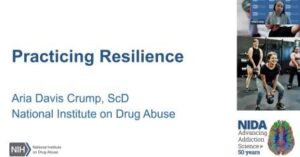
Science is an exciting, challenging, and rewarding career choice, particularly when your work is in the service of human health. Despite this, early career scientists must master new skills, build reliable professional networks, and make pivotal career decisions, all while navigating personal lives and family obligations. The stress of these challenges often taxes the mental well-being of scholars. Dr. Crump will introduce the concept of resilience as a practice and discuss why it is so critical for junior investigators to know themselves and be their own best advocate.
 Aria Davis Crump, ScD is currently the Director of NIDA’s Office of Diversity and Health Disparities, and the Deputy Director of NIDA’s Office of Research Training, Diversity, and Disparities. She transitioned into this role in 2023 after acting as a Health Scientist Administrator and as the Deputy Branch Chief in NIDA’s Prevention Research Branch. She is trained as a behavioral scientist and public health professional specializing in the social, cognitive, and developmental aspects of risk-taking in adolescence and applications to preventive interventions. Dr. Crump received her doctoral degree from the Johns Hopkins University Bloomberg School of Public Health, and completed postdoctoral studies in prevention research at the Eunice Kennedy Shriver National Institute of Child Health and Human Development. Throughout her career, she has been dedicated to promoting prevention science, empowering the next generation of NIH researchers, advancing health equity, and supporting diversity in the research workforce.
Aria Davis Crump, ScD is currently the Director of NIDA’s Office of Diversity and Health Disparities, and the Deputy Director of NIDA’s Office of Research Training, Diversity, and Disparities. She transitioned into this role in 2023 after acting as a Health Scientist Administrator and as the Deputy Branch Chief in NIDA’s Prevention Research Branch. She is trained as a behavioral scientist and public health professional specializing in the social, cognitive, and developmental aspects of risk-taking in adolescence and applications to preventive interventions. Dr. Crump received her doctoral degree from the Johns Hopkins University Bloomberg School of Public Health, and completed postdoctoral studies in prevention research at the Eunice Kennedy Shriver National Institute of Child Health and Human Development. Throughout her career, she has been dedicated to promoting prevention science, empowering the next generation of NIH researchers, advancing health equity, and supporting diversity in the research workforce.
Presented by: David Perlman, MD; Sam Friedman, PhD, Tetyana Vasylyeva, MSc, MPH, DPhil; Tim Rhodes, PhD
Presentation title: Big Events: Approaches to Studying and Reinvigorating HIV Prevention and Care for People Who Use Drugs in the Midst of Societal Disruption
Recent history has shown that gains in HIV elimination among people who use drugs are susceptible to erosion by large-scale, sudden onset “Big Events” that interrupt access to services and alter substance use networks, patterns, and practices. Environmental disasters, economic crises, wars and conflicts, and pandemics are examples of Big Events that have disrupted HIV, HCV, and substance use disorder (SUD) prevention and treatment, and sometimes lead new populations to use drugs. In this first of a series of symposia and other events, we will provide examples of how Big Events have changed the course of the HIV, HCV, and substance use epidemics and of how research on these changes has been conducted.
David Perlman (start at 2:56)
Sam Friedman (start at 46:40)
Tetyana Vasylyeva (start at 1:35:45)
Tim Rhodes (start at 2:22:18)
 Big Events: What They are and Their Relevance to the HIV/HCV and Substance Use Epidemics
Big Events: What They are and Their Relevance to the HIV/HCV and Substance Use Epidemics
David Perlman, MD
Director, CDUHR Infectious Disease Epidemiology and Social-behavioral Theory Core
Professor of Medicine, Mount Sinai Health System Icahn School of Medicine
 Historical and Theoretical Roots of the Big Events Framework for Studying Epidemics
Historical and Theoretical Roots of the Big Events Framework for Studying Epidemics
Sam Friedman, PhD
Associate Director & Senior Theoretician, CDUHR Infectious Disease Epidemiology and Social-behavioral Theory Core
Research Professor, NYU Grossman School of Medicine
 Applying the Big Events Framework: HIV and Stigma Research During the War on Ukraine
Applying the Big Events Framework: HIV and Stigma Research During the War on Ukraine
Tetyana Vasylyeva, MSc, MPH, DPhil
Assistant Professor, University of California, Irvine
 Featured Discussant
Featured Discussant
Tim Rhodes, PhD
Professor, London School of Hygiene & Tropical Medicine
 Moderator
Moderator
Holly Hagan, PhD
CDUHR Co-Director
Professor Emerita, NYU School of Global Public Health
Presented by: Ellenie Tuazon, MPH & Alex Harocopos, PhD MSc
Presentation title: New York City 2022 Overdose Mortality Data
Recent data from the New York City Department of Health and Mental Hygiene (DOHMH) demonstrates that the overdose epidemic continues to worsen in NYC, with older Black New Yorkers experiencing the highest rates of overdose in the city. New data indicating the setting of overdose show that approximately seven out of ten overdoses occurred in a private setting; however, overdoses in public outdoor settings have also increased in recent years.
NYC’s 2022 overdose mortality data will be presented and highlight responses implemented by the Health Department to help inform efforts to reduce overdose deaths, and discuss what more can be done to ensure that New Yorkers get the information and support they need to mitigate overdose risk.
Presented by: Wiley Jenkins, PhD, MPH, FACE
Presentation title: Variation in HIV Risk Behaviors Among People Who Use Drugs in Rural US Communities
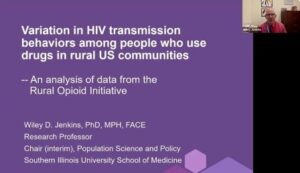
The opioid and drug use epidemic continues to evolve and expand. While the proportion of new HIV cases attributable to drug injection is increasing, it remains relatively modest in comparison to sexual transmission. Drawing data from the 8-site Rural Opioid Initiative which recruited rural people who use drugs (PWUD) across 10 states, we found significant variation in the frequency of drug use and sexual behaviors associated with infectious disease transmission and their association with participant characteristics such as age, race, and sexual orientation.
 Wiley Jenkins graduated with a double major in chemistry and biology in 1991 and entered the laboratory workforce at Washington University School of Medicine. This was soon followed by 13 years in the Illinois Department of Public Health laboratories where he began as an environmental chemist and eventually became both state laboratory bioterrorism coordinator and laboratory operations manager. During this time, he also received a CDC scholarship for graduate studies at Tulane University and earned his MPH. He was then accepted into the doctoral program at the University of Illinois at Chicago and received his PhD in 2007. With this experience, he joined the SIU Department of Family and Community Medicine as research director. He was appointed Science Director for SIU Medicine’s newly created Office of Population Science and Policy in 2016 and transitioned to Chief of Epidemiology and Biostatistics when the office transitioned to the full academic Department of Population Science and Policy, where he also serves as the Interim Chair.
Wiley Jenkins graduated with a double major in chemistry and biology in 1991 and entered the laboratory workforce at Washington University School of Medicine. This was soon followed by 13 years in the Illinois Department of Public Health laboratories where he began as an environmental chemist and eventually became both state laboratory bioterrorism coordinator and laboratory operations manager. During this time, he also received a CDC scholarship for graduate studies at Tulane University and earned his MPH. He was then accepted into the doctoral program at the University of Illinois at Chicago and received his PhD in 2007. With this experience, he joined the SIU Department of Family and Community Medicine as research director. He was appointed Science Director for SIU Medicine’s newly created Office of Population Science and Policy in 2016 and transitioned to Chief of Epidemiology and Biostatistics when the office transitioned to the full academic Department of Population Science and Policy, where he also serves as the Interim Chair.
Presented by: Gavin Bart, MD, PhD, FACP, DFASAM
Presentation title: Fentanyl and Xylazine: Challenging the Treatment Paradigm
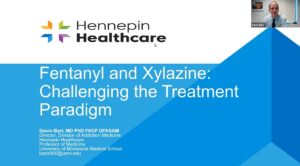
 Gavin Bart is Director of the Division of Addiction Medicine at Hennepin Healthcare and Professor of Medicine at the University of Minnesota Medical School. He received his MD from the University of Minnesota and trained in internal medicine at the Hennepin County Medical Center. His PhD is in experimental and clinical pharmacology, also from the University of Minnesota. His areas of expertise include clinical pharmacology and the pharmacological management of opioid use disorders. His current research areas include the population pharmacokinetics of methadone, genetic influences of methadone pharmacology and treatment outcome, and implementation of opioid use disorder treatment in hospital and primary care settings. He is PI of NorthStar Node of the NIDA National Drug Abuse Treatment Clinical Trials Network and has provided extensive international technical assistance including to the PEPFAR/Substance Abuse and Mental Health Services Administration’s capacity building HIV and addiction efforts in Vietnam and South East Asia and the US Bureau of International Narcotics and Law Enforcement Affairs’ effort to develop international technology transfer centers for addiction prevention and treatment.
Gavin Bart is Director of the Division of Addiction Medicine at Hennepin Healthcare and Professor of Medicine at the University of Minnesota Medical School. He received his MD from the University of Minnesota and trained in internal medicine at the Hennepin County Medical Center. His PhD is in experimental and clinical pharmacology, also from the University of Minnesota. His areas of expertise include clinical pharmacology and the pharmacological management of opioid use disorders. His current research areas include the population pharmacokinetics of methadone, genetic influences of methadone pharmacology and treatment outcome, and implementation of opioid use disorder treatment in hospital and primary care settings. He is PI of NorthStar Node of the NIDA National Drug Abuse Treatment Clinical Trials Network and has provided extensive international technical assistance including to the PEPFAR/Substance Abuse and Mental Health Services Administration’s capacity building HIV and addiction efforts in Vietnam and South East Asia and the US Bureau of International Narcotics and Law Enforcement Affairs’ effort to develop international technology transfer centers for addiction prevention and treatment.
Presented by: Skyler Jackson, Justin Knox, Diana Sheehan, Suzan Walters, Lindsey Friend & Dustin Duncan
Presentation title: Constructing and Securing an NIH K Award

 Skyler Jackson is an Assistant Professor of Public Health at Yale University who conducts research focusing on the ways individuals’ social identities (e.g., race, gender, sexual orientation) shape their everyday lives and influence health and well-being. In particular, he is interested in how experiences of stigma—if not adequately coped with—interfere with psychological functioning and contribute to health disparities. Supporting his research, Dr. Jackson has received an NIMH K01 entitled, “Intersectional stigma, mental health, and HIV risk among US GBM of color”.
Skyler Jackson is an Assistant Professor of Public Health at Yale University who conducts research focusing on the ways individuals’ social identities (e.g., race, gender, sexual orientation) shape their everyday lives and influence health and well-being. In particular, he is interested in how experiences of stigma—if not adequately coped with—interfere with psychological functioning and contribute to health disparities. Supporting his research, Dr. Jackson has received an NIMH K01 entitled, “Intersectional stigma, mental health, and HIV risk among US GBM of color”.
 Justin Knox is an Assistant Professor of Clinical Implementation Science and Intervention (in Psychiatry) at Columbia University. His research focuses on HIV and substance use among racial and sexual minorities, both domestically and globally. He is the PI of a K01 award to develop and evaluate an intervention that aims to improve HIV treatment outcomes and reduce alcohol use in heavy-drinking Black MSM.
Justin Knox is an Assistant Professor of Clinical Implementation Science and Intervention (in Psychiatry) at Columbia University. His research focuses on HIV and substance use among racial and sexual minorities, both domestically and globally. He is the PI of a K01 award to develop and evaluate an intervention that aims to improve HIV treatment outcomes and reduce alcohol use in heavy-drinking Black MSM.
 Diana Sheehan is an Associate Professor in the Department of Epidemiology at the Robert Stempel College of Public Health and Social Work at Florida International University (FIU). She aims to contribute to health equity among the Latino population via epidemiologic studies that identify disparities along the HIV care continuum and via the design and testing of evidence-based interventions. Her current K01 examines how daily substance use, psychosocial factors, and activity spaces affect ART adherence and develops the groundwork for a just-in-time adaptive intervention to improve ART adherence.
Diana Sheehan is an Associate Professor in the Department of Epidemiology at the Robert Stempel College of Public Health and Social Work at Florida International University (FIU). She aims to contribute to health equity among the Latino population via epidemiologic studies that identify disparities along the HIV care continuum and via the design and testing of evidence-based interventions. Her current K01 examines how daily substance use, psychosocial factors, and activity spaces affect ART adherence and develops the groundwork for a just-in-time adaptive intervention to improve ART adherence.
 Suzan Walters is an Assistant Professor in the Division of Epidemiology in the Department of Population Health at the NYU Grossman School of Medicine and an affiliated researcher at CDUHR. Her current K01 grant focuses on how intersectional stigma experiences affect health outcomes among people who use drugs. She has worked as an ethnographer for the National HIV Behavioral Surveillance System, a program director for the Center for the Study of Men and Masculinities, and a research fellow for AIDS Foundation Chicago.
Suzan Walters is an Assistant Professor in the Division of Epidemiology in the Department of Population Health at the NYU Grossman School of Medicine and an affiliated researcher at CDUHR. Her current K01 grant focuses on how intersectional stigma experiences affect health outcomes among people who use drugs. She has worked as an ethnographer for the National HIV Behavioral Surveillance System, a program director for the Center for the Study of Men and Masculinities, and a research fellow for AIDS Foundation Chicago.
 Lindsey Friend is a Research Training and Career Development Program Officer (Health Science Administrator) in the Office of Research Training, Diversity, and Health Disparities at the National institute on Drug Abuse (NIDA). Her priority is to assist NIDA’s extramural research training and career development programs. Lindsey received her doctorate in neuroscience from Brigham Young University where she studied cocaine and cannabinoid effects on reward circuitry. She did a postdoctoral fellowship at the National Institute of Child Health and Human Development studying glutamate receptor physiology before joining NIDA in 2020.
Lindsey Friend is a Research Training and Career Development Program Officer (Health Science Administrator) in the Office of Research Training, Diversity, and Health Disparities at the National institute on Drug Abuse (NIDA). Her priority is to assist NIDA’s extramural research training and career development programs. Lindsey received her doctorate in neuroscience from Brigham Young University where she studied cocaine and cannabinoid effects on reward circuitry. She did a postdoctoral fellowship at the National Institute of Child Health and Human Development studying glutamate receptor physiology before joining NIDA in 2020.

Dustin T. Duncan is the Director of the CDUHR Pilot Projects and Mentoring Core and is an Associate Professor in the Department of Epidemiology at Columbia University’s Mailman School of Public Health, where he directs the Columbia Spatial Epidemiology Lab and co-directs the department’s Social and Spatial Epidemiology Unit. Dr. Duncan is a Social and Spatial Epidemiologist, studying how specific neighborhood characteristics influence population health and health disparities.
Presented by: Jae Sevelius, PhD
Presentation title: Designing Interventions for Impact: Community-driven Approaches to Addressing Health Inequities among Transgender Communities
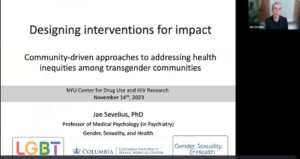
How do we move from formative work and observational studies documenting health inequities to designing, testing, and implementing interventions?, Dr. Sevelius will share their approach to building a program of community-engaged research to improve health outcomes among transgender and gender expansive communities. This approach includes iterative needs assessments, intervention development and testing, and capacity building with communities that experience marginalization and the organizations that serve them. Jae Sevelius (they/them), is a Clinical Psychologist, Professor of Medical Psychology (in Psychiatry) at Columbia University, and a Research Scientist at New York State Psychiatric Institute. Dr. Sevelius’ research focuses on the role of gender affirmation in mental health and HIV-related health outcomes among transgender and gender expansive people. They work in collaboration with community-led research teams to develop and evaluate trauma-informed, gender-affirming health promotion interventions for transgender and gender expansive people in the United States and Brazil. Dr. Sevelius also specializes in psychedelic-assisted therapy for identity-based trauma and holds a Certificate in Psychedelic-Assisted Therapies and Research from the California Institute of Integral Studies. Dr. Sevelius’ research has been funded by the National Institutes of Health, the Centers for Disease Control and Prevention, the California HIV/AIDS Research Program, as well as other public institutions and private foundations.
Jae Sevelius (they/them), is a Clinical Psychologist, Professor of Medical Psychology (in Psychiatry) at Columbia University, and a Research Scientist at New York State Psychiatric Institute. Dr. Sevelius’ research focuses on the role of gender affirmation in mental health and HIV-related health outcomes among transgender and gender expansive people. They work in collaboration with community-led research teams to develop and evaluate trauma-informed, gender-affirming health promotion interventions for transgender and gender expansive people in the United States and Brazil. Dr. Sevelius also specializes in psychedelic-assisted therapy for identity-based trauma and holds a Certificate in Psychedelic-Assisted Therapies and Research from the California Institute of Integral Studies. Dr. Sevelius’ research has been funded by the National Institutes of Health, the Centers for Disease Control and Prevention, the California HIV/AIDS Research Program, as well as other public institutions and private foundations.
Presented by: Caroline Dorsen, PhD, FNP-BC, FAAN
Presentation title: Psychedelics: Possibilities and Controversies

Link to Video
Psychedelics are suddenly everywhere and are being touted as miracle cures for everything from trauma to headaches. With FDA approval of MDMA and psilocybin expected in the next year, this presentation will briefly review where we are in psychedelic research, how we got here, and what issues researchers and clinicians should be aware of moving forward. Particular attention will be paid to big-picture social justice issues, including equity and access, climate justice, racial and queer justice, and indigenous rights.
 Caroline Dorsen, PhD, FNP-BC, FAAN (she/her) is Associate Dean for Clinical Partnerships at Rutgers University School of Nursing, where she is on the faculty of both the schools of nursing and public health. She is a scholar, educator, and family nurse practitioner whose passion is the intersection of health and social justice. For over 15 years her research, teaching and advocacy work has largely focused on the role of stigma, bias and discrimination in substance use and LGBTQ+ health disparities. Her current project is examining nurses’ attitudes towards psychedelic drug use as a healing modality.
Caroline Dorsen, PhD, FNP-BC, FAAN (she/her) is Associate Dean for Clinical Partnerships at Rutgers University School of Nursing, where she is on the faculty of both the schools of nursing and public health. She is a scholar, educator, and family nurse practitioner whose passion is the intersection of health and social justice. For over 15 years her research, teaching and advocacy work has largely focused on the role of stigma, bias and discrimination in substance use and LGBTQ+ health disparities. Her current project is examining nurses’ attitudes towards psychedelic drug use as a healing modality.
Presented by: Mbabazi Kariisa, PhD, MPH & Liz Rivera Blanco, MD
Presentation title: Trends and Characteristics of Xylazine Detection in Drug Overdose Deaths and Clinical Considerations
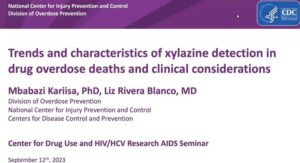
Link to Video
This presentation will provide an overview of the epidemiology of fentanyl-involved overdoses with xylazine detected and/ or co-involved. In addition, Drs. Kariisa and Rivera Blanco will discuss xylazine’s mechanism of action, background, clinical presentation, overdose and withdrawal management, and chronic use complications.
 Dr. Mbabazi Kariisa is a Health Scientist in the Division of Overdose Prevention in CDC’s National Center for Injury Prevention and Control and serves as a science officer focusing on mortality-related activities for CDC’s Overdose Data to Action program. Her work focuses mainly on drug overdose death surveillance and analysis of data from the State Unintentional Drug Overdose Reporting System (SUDORS). Prior to joining NCIPC, she worked as an injury epidemiologist for the Ohio Department of Health in Columbus, Ohio where she focused on an array of injury-related topics. Dr. Kariisa received her PhD in Epidemiology from The Ohio State University and an MPH in International Health from the University of Michigan.
Dr. Mbabazi Kariisa is a Health Scientist in the Division of Overdose Prevention in CDC’s National Center for Injury Prevention and Control and serves as a science officer focusing on mortality-related activities for CDC’s Overdose Data to Action program. Her work focuses mainly on drug overdose death surveillance and analysis of data from the State Unintentional Drug Overdose Reporting System (SUDORS). Prior to joining NCIPC, she worked as an injury epidemiologist for the Ohio Department of Health in Columbus, Ohio where she focused on an array of injury-related topics. Dr. Kariisa received her PhD in Epidemiology from The Ohio State University and an MPH in International Health from the University of Michigan.
 Dr. Liz Rivera Blanco is a Medical Toxicology Fellow from the Emory University/ CDC program, currently working in the Division of Overdose Prevention in CDC’s National Center for Injury Prevention and Control (NCIPC). Prior to joining DOP/NCIPC, she completed a 3- year residency in Emergency Medicine at St. Luke’s Episcopal Medical Center Ponce, Puerto Rico and medical school at Universidad Autonoma de Guadalajara in Mexico.
Dr. Liz Rivera Blanco is a Medical Toxicology Fellow from the Emory University/ CDC program, currently working in the Division of Overdose Prevention in CDC’s National Center for Injury Prevention and Control (NCIPC). Prior to joining DOP/NCIPC, she completed a 3- year residency in Emergency Medicine at St. Luke’s Episcopal Medical Center Ponce, Puerto Rico and medical school at Universidad Autonoma de Guadalajara in Mexico.
